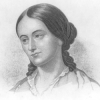Margaret Fuller

Margaret Fuller
Sarah Margaret Fuller Ossoli, commonly known as Margaret Fuller, was an American journalist, critic, and women's rights advocate associated with the American transcendentalism movement. She was the first full-time American female book reviewer in journalism. Her book Woman in the Nineteenth Century is considered the first major feminist work in the United States...
NationalityAmerican
ProfessionActivist
Date of Birth23 May 1810
CityCambridge, MA
CountryUnited States of America
Our desires, once realized, haunt us again less readily.
I now know all the people worth knowing in America, and I find no intellect comparable to my own.
It is not because the touch of genius has roused genius to production, but because the admiration of genius has made talent ambitious, that the harvest is still so abundant.
In order that she may be able to give her hand with dignity, she must be able to stand alone.
No temple can still the personal griefs and strifes in the breasts of its visitors.
It seems that it is madder never to abandon one's self than often to be infatuated; better to be wounded, a captive and a slave, than always to walk in armor.
Male and female represent the two sides of the great radical dualism. But in fact they are perpetually passing into one another. Fluid hardens to solid, solid rushes to fluid. There is no wholly masculine man, no purely feminine woman.
Beware of over-great pleasure in being popular or even beloved. As far as an amiable disposition and powers of entertainment make you so, it is a happiness; but if there is one grain of plausibility, it is poison.
It is a vulgar error that love, a love, to woman is her whole existence; she is born for Truth and Love in their universal energy
A house is no home unless it contains food and fire for the mind as well as for the body. For human beings are not so constituted that they can live without expansion. If they do not get it in one way, they must in another, or perish.
Next to invention is the power of interpreting invention; next to beauty the power of appreciating beauty.
Essays, entitled critical, are epistles addressed to the public, through which the mind of the recluse relieves itself of its impressions.
The Arabian horse will not plough well, nor can the plough-horse be rode to play the jereed.
When I saw it, the damage was severe, ... It really fried the unit.